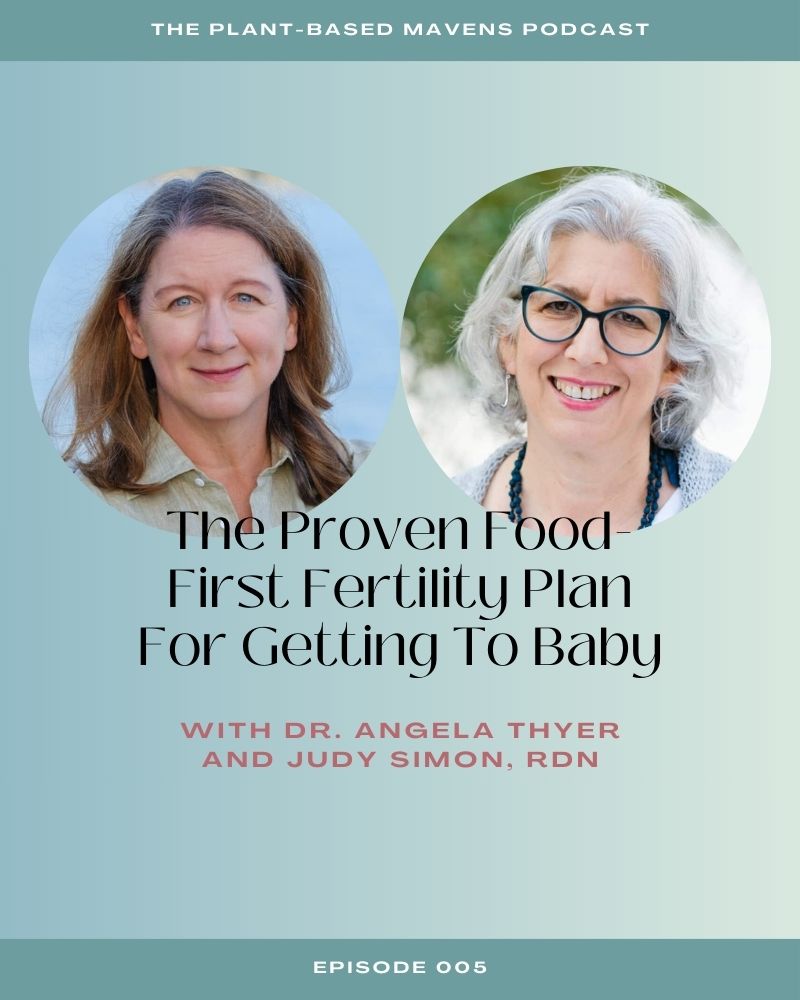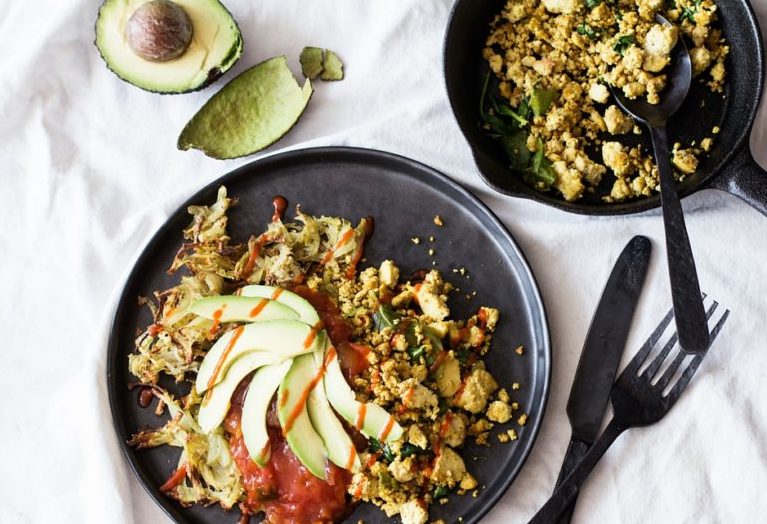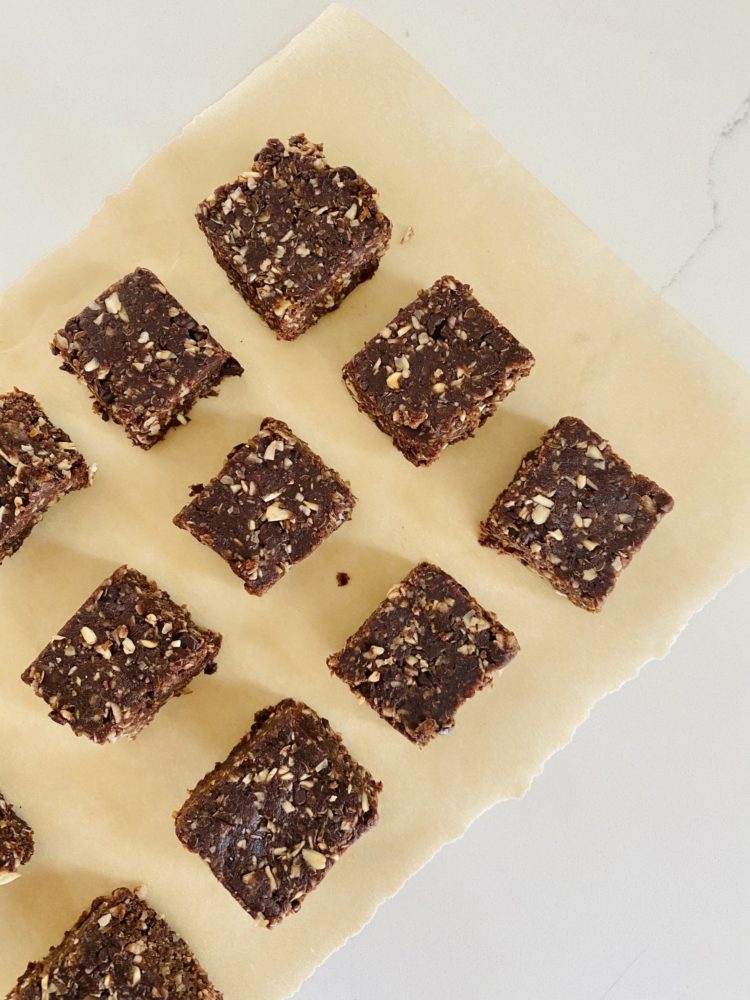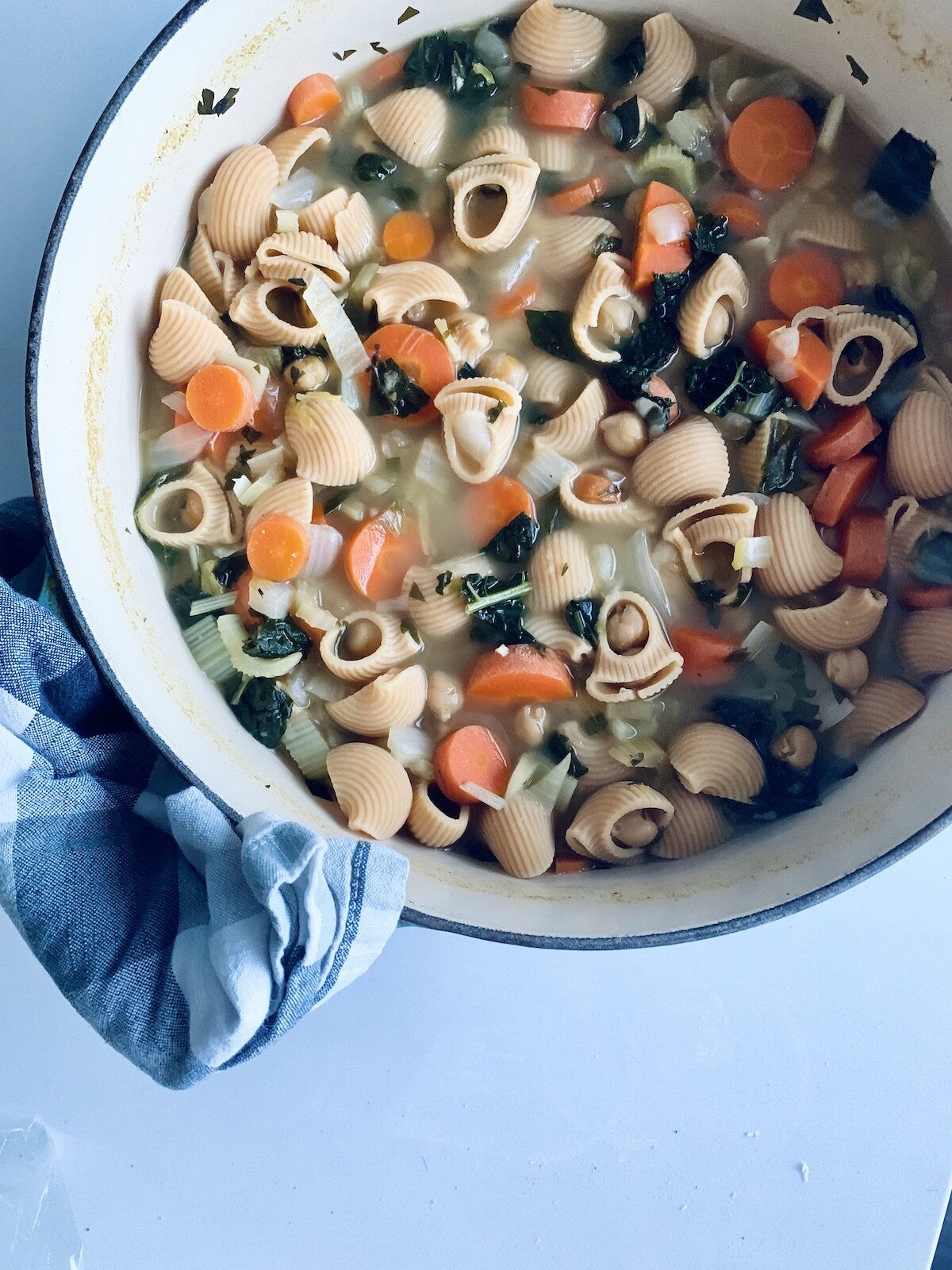Planning for a pregnancy is an exciting time. Your fertility journey is also one of the most important times in life to tune in to your health and nutrition. About 12% of U.S. women experience difficulty getting pregnant or sustaining a pregnancy, and while fertility is impacted by many different factors, the effects of diet on fertility are clear. A well-balanced diet can play an important role in supporting your fertility and helping you get pregnant. This guide is your ultimate resource for everything you need to know about boosting fertility and the health benefits of plant-based nutrition for a successful pregnancy.
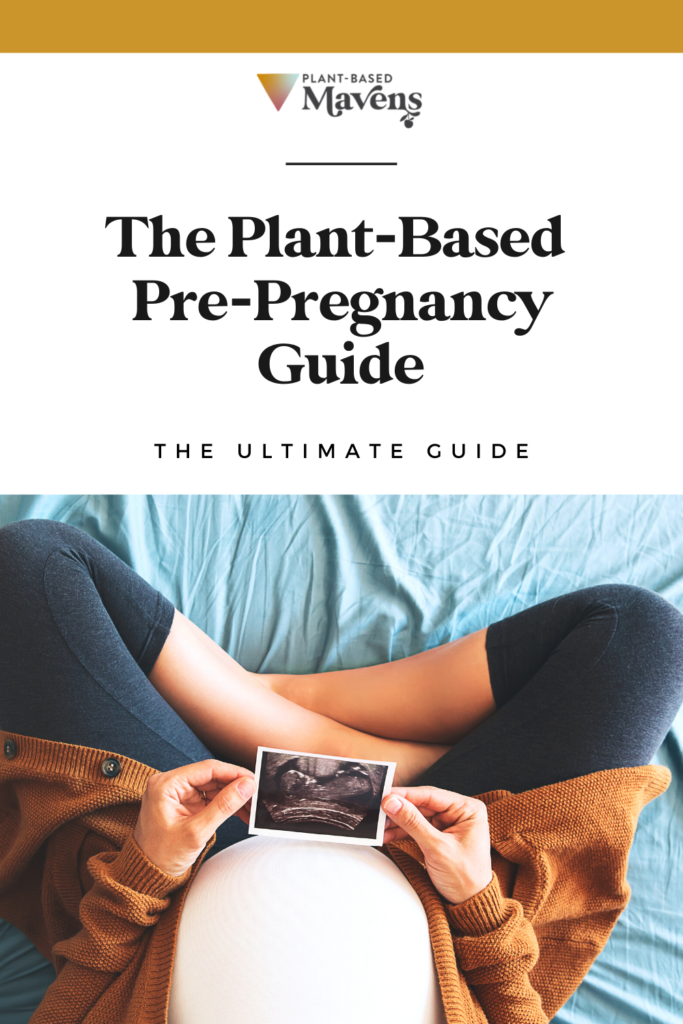
Does a plant-based or vegan diet help with fertility?
Many studies have shown that a plant-based diet can have a positive impact on fertility in women. A recent study found that women who consume low amounts of fruit and high amounts of processed fast food are less likely to conceive. In fact, women with the lowest intake of fruit had a higher risk of infertility, with the risk increasing from 8% to 12%. And that’s just fruit! The benefits of plant-based foods is far-reaching.
One key factor in a plant-based or vegan diet that may aid fertility is the abundance of nutrients found in plant-based foods like fruits, vegetables, nuts, seeds, whole grains, and legumes. These foods provide a range of phytonutrients, including polyphenols, which have anti-inflammatory, anti-microbial, and antioxidant effects on our cells. This can have positive effects on pregnancy rates and overall health.
Overall, a plant-based diet rich in fruits, vegetables, whole grains, and plant proteins can provide the necessary nutrients to support fertility and increase the chances of conceiving. It is important to consult with a healthcare provider or fertility dietitian for personalized advice on optimizing a plant-based diet for fertility.
What foods increase fertility?
When it comes to boosting fertility, certain dietary factors can play a crucial role in supporting the reproductive system. These foods contain antioxidants and nutrients that can enhance ovulation or improve sperm quality and quantity. While no eating pattern or individual food can fix medical issues affecting fertility, incorporating these fertility-boosting foods into your diet may help increase your chances of conceiving.
Dark leafy green vegetables
Dark leafy green vegetables, such as spinach, kale, and arugula play a crucial role in boosting fertility due to their high nutrient content. These vegetables are rich in folate, a vital nutrient for early pregnancy and fetal development. Folate is essential for preventing neural tube defects and supporting overall reproductive health. It is recommended that people looking to conceive incorporate 1-2 servings of dark leafy green vegetables into their daily diet to ensure they are getting an adequate amount of this important nutrient. Whether you add them to salads, cook them into various dishes, or blend into smoothies, incorporating dark leafy greens into a plant-based or vegetarian diet can greatly enhance fertility outcomes.
Plant-based proteins
Beans are a powerhouse when it comes to boosting fertility. Beans are also rich in folate as well as an excellent source of plant-based protein. They also offer a wealth of minerals such as zinc, magnesium, B vitamins, and iron, all of which play a key role in enhancing female fertility. Lentils are a versatile plant-based protein source that can also be beneficial for fertility. By replacing animal proteins with plant-based options like lentils, you can increase your intake of essential nutrients and antioxidants that support ovulation and overall reproductive health. Incorporating beans and lentils into your diet can provide a significant nutritional boost and increase chances of conception.
Whole grains
Research has indicated that a higher intake of whole grains is associated with improved reproductive outcomes, making them a key component of a fertility-friendly diet. Additionally, whole grains have been linked to improved embryo quality following intracytoplasmic sperm injection, further highlighting their potential benefits for enhancing fertility. Overall, incorporating whole grains into your diet may play a crucial role in supporting reproductive health and increasing the likelihood of successful conception.
Avocados and walnuts
Including avocados in your diet can help support a healthy reproductive system. Rich in folate, monounsaturated fatty acids, fiber, and antioxidants, avocados have been shown to reduce ovulatory infertility.
Walnuts are a convenient and nutritious food that can boost fertility in both men and women. Rich in omega-3 fatty acids, walnuts can enhance ovulation and support healthy sperm. Additionally, walnuts contain vitamin E, an antioxidant that can help increase sperm count and motility.
By incorporating these fertility-boosting foods into your diet, you can support your reproductive health and increase your chances of conceiving. Talk to your healthcare provider or a fertility dietitian for personalized recommendations and guidance on optimizing your diet for fertility.
What foods decrease fertility?
Eating more whole, plant foods also means that you’re nudging out foods that have negative effects on fertility. Processed foods and some animal products, which are often high in saturated fats, have been linked to negative fertility and pregnancy outcomes. Consuming sugary drinks has also been associated with a reduction in the chances of conceiving. Therefore, avoiding processed foods and sugary drinks in favor of a more plant-based or vegan diet may help improve your chances of getting pregnant.
High intake of animal products, particularly consumption of meat, can have a negative impact on fertility due to the components they contain. Heme iron, saturated fats, trans-fatty acids, and advanced glycation end products (AGEs) found in animal products can induce oxidative stress, leading to damage to sperm and egg cells as well as DNA within the cells. In addition, inflammation caused by AGEs attaching to receptors throughout the reproductive tract can affect implantation by preventing the embryo from properly embedding into the lining. To improve fertility, consider minimizing consumption of animal products, especially meat, to avoid these negative effects and increase intake of plant foods. There is mixed evidence on dairy products and fertility. While dairy products are not a must in your diet, research shows that choosing high-fat dairy products (instead of low-fat dairy products) may improve fertility.
Plant-based Fertility Nutrients To Know
When it comes to fertility, it’s important to include dietary sources of essential nutrients that support your chances of getting pregnant. These key nutrients have beneficial effects during pre-pregnancy, pregnancy, and beyond!
Folate
Folate is a B vitamin that plays a critical part in embryo development in the earliest days of pregnancy, and a folate-rich diet has been shown to improve fertility. Since folate comes into play during a time when you might not yet know that you are pregnant, it’s a good idea to make sure you’re meeting folate needs as soon as you begin planning for a pregnancy.
Leafy greens are a great source of folate as well as beans. Plant-based eaters tend to do a better job meeting their folate needs compared to meat eaters. Many foods are also fortified with folate. However, because this vitamin is so important to preventing serious birth defects of the brain and spinal cord, I usually recommend that any woman planning a pregnancy begin taking a folic acid (the synthetic version of folate) supplement. Bonus: it might also boost your chances of getting pregnant!
Women who are not pregnant or breastfeeding need 400 micrograms of folate per day. Your folate needs increase when you become pregnant (read more about Nutrient Needs For Pregnancy).
Takeaway:
- Take a folic acid supplement that provides 400-800 micrograms
Vitamin B12
Vitamin B12 supports your baby’s brain and nervous system development, so, just like folate, it’s an important nutrient to pay attention to before you become pregnant so that your baby has what they need in those early days of pregnancy. Plant-based eaters need to include a reliable source of B12 through supplements or fortified foods since this vitamin is not found in plant foods.
Women who are not pregnant or breastfeeding need 2.4 micrograms of B12 per day. Your needs will increase when you become pregnant (read more about Nutrient Needs For Pregnancy).
Takeaway:
- Regularly eat fortified foodsTwo servings per day, 2 to 3.5 µg eachNutritional yeast, plant-based milks, and cereals are commonly fortified foods. Check labels! Not all brands are fortified, and the amount of fortification varies.
- Take a B12 supplement (cyanocobalamin) 2,000µg 1-2 times a week or at least 25µg dailyWe can only absorb small amounts at a time – that’s why supplements are so much higher than needs.
Iron and Vitamin C
Meeting iron needs with plant-based iron sources specifically has been shown to support normal ovulation, which in turn supports fertility. I included vitamin C as well because eating plant-based iron sources with vitamin C-rich foods at the same meal significantly boosts absorption of the iron. For most people, an iron supplement is probably not necessary unless you have been tested for low iron.
Iron-rich Plant Foods:
- Almonds
- Blackstrap molasses
- Broccoli
- Beans
- Bok choy
- Cashews
- Dark chocolate
- Dried figs and raisins
- Edamame
- Kale
- Lentils
- Peanuts
- Peas
- Pistachios
- Pumpkin
- Spinach
- Sunflower seeds
- Tofu
Vitamin C-rich Plant Foods (Iron Enhancers):
- Bell peppers
- Broccoli
- Brussels sprouts
- Carrots
- Cabbage
- Cauliflower
- Citrus fruits (grapefruit, oranges)
- Kale
- Kiwi
- Strawberries
- Tomatoes
Women who are not pregnant or breastfeeding need 18 milligrams of iron per day. Your needs will increase by quite a lot when you become pregnant (read more about Nutrient Needs For Pregnancy).
Takeaway:
- Increase iron intake by eating more iron-rich plant-based foods
- Eat vitamin C-rich foods at every meal to boost iron absorption from other foods (increasing consumption of fruits and vegetables is a great way to boost vitamin C, as well as levels of antioxidants!)
- Tea and coffee can inhibit iron absorption, so drink them before or after meals instead of during
- Calcium supplements can also inhibit iron absorption, so do not take them with meals
- Prepare meals in cast-iron cookware to boost iron content
High-Quality Carbohydrate Sources
Studies show that eating more foods that offer “high-quality” carbohydrates and eating fewer foods that are considered “low-quality” carbohydrates may increase fertility. High-quality carbohydrate foods include starchy vegetables like winter squashes, potatoes, sweet potatoes, and corn; fruit; beans; whole grains like oatmeal, brown rice, and quinoa; and foods made from whole grain flours like whole wheat bread or brown rice pasta. These foods help keep blood sugar and insulin levels steady, and steady blood sugar has been linked to a 2x increase in the ability to conceive.
Takeaway:
- Swap refined (low-quality) grains like white pasta, sugary cereals, and white bread for whole (high-quality) grains like whole wheat pasta, oatmeal, whole grain bread, and starchy vegetables like sweet potatoes and winter squash
Healthy Fats
Eating healthy sources of fats can help lower inflammation in the body, keep blood sugar and insulin levels healthy, and therefore improve fertility health.
Takeaway:
- First, make sure you are meeting all of your omega-3 needs (ALA, EPA, DHA) by:Eating a daily source of ALA omega-3s (1 tbsp ground flaxseeds or chia seeds, 2 tbsp. hemp seeds, or about 10-12 walnut halves)Taking 200-300mg of an algae-based DHA/EPA omega-3 supplement a few times per week
- Second, focus on swapping unhealthy saturated fat foods (meat, eggs, high-fat dairy, butter) for healthy fat foods (avocado, olives, olive oil, seeds).
- Third, completely avoid foods that include “partially hydrogenated” in the ingredients list. This will help you avoid trans fats which have been linked to endometriosis and higher miscarriage rates.
Plant-based Protein Sources
Studies show that for every time you swap animal-based proteins for plant-based proteins, you cut your infertility risk in half! So, trade that beef, chicken, turkey, eggs, fish, and dairy for beans, lentils, tofu, tempeh, soymilk, nuts, and seeds.
Nutrient-dense Produce
Infertility is often paired with higher levels of oxidative stress. The best way to lower oxidative stress is by eating plenty of antioxidant-rich foods, and fruits and vegetables pack the most antioxidant punch.
Aim to eat at least 1-2 servings of fruits and vegetables at every meal, with the goal of about 5 servings of vegetables and 3 servings of fruit everyday. And the more color, the better!
Summary For Plant-based Fertility
- Take a multivitamin or supplement that provides at least 400µg of folic acid every day
- Take a multivitamin or supplement that provides at least 25µg of cyanocobalamin B12 every day
- Eat vitamin C-rich foods at as many meals as possible
- Swap refined grains for whole grains and starchy vegetables
- Eat a daily source of ALA omega-3s (1 tbsp ground flaxseeds or chia seeds, 2 tbsp. hemp seeds, or about 10-12 walnut halves)
- Take 200-300mg of an algae-based DHA/EPA omega-3 supplement a few times per week
- Swap out saturated fats in favor of plant-based fats, and completely avoid ingredients lists that include “partially hydrogenated”
- Swap animal-based protein foods for plant-based protein foods
- Eat 3 servings of fruit and 5 servings of vegetables each day – the more color, the better
Other Considerations:
Other lifestyle factors can have effects on fertility that are either positive or negative.
- Weight: Finding a healthy weight that is right for your body and allows your hormones to function properly is an important aspect of fertility. However, it’s generally better to focus on a healthy diet and lifestyle versus weight loss. I’d rather you have a healthy relationship with food than to achieve an arbitrary number on the scale at any cost! Healthy women come in all shapes and sizes.
- Exercise: Continuing to move your body in a way that feels good will support your fertility health.
- Avoid alcohol and sweetened drinks: Alcohol consumption and consumption of sugar-sweetened beverages like soda can have negative effects of fertility.
- Reduce exposure to toxins by choosing organic produce when it makes sense. A recent study showed that higher intakes of pesticides was associated with decreased chances of getting pregnant in women undergoing fertility treatments. Therefore, organic produce can help lower your intake of pesticides. But don’t let perfect be the enemy of good enough! Your first priority should be eating as many fruits and vegetables as possible – organic or conventional. To learn more about reducing your exposure to hormone-disrupting chemicals, read this post.
- Fertility isn’t just about you! Female fertility is only part of the equation. Your partner has equal responsibility in supporting your joint efforts to conceive. Many of the guidelines above including eating plenty of whole grains, fruits and vegetables, healthy fats, and plant-based proteins can support your partner’s fertility health too.
Want more plant-based fertility support?
Grab the free PBM Fertility Checklist, created especially for mamas-to-be interested in plant-based eating.
Read this post on how to pick the best prenatal vitamin.
Listen to this episode of the PBM Podcast where I interview two fertility experts on the best diet for fertility and how to prepare for a healthy pregnancy.
